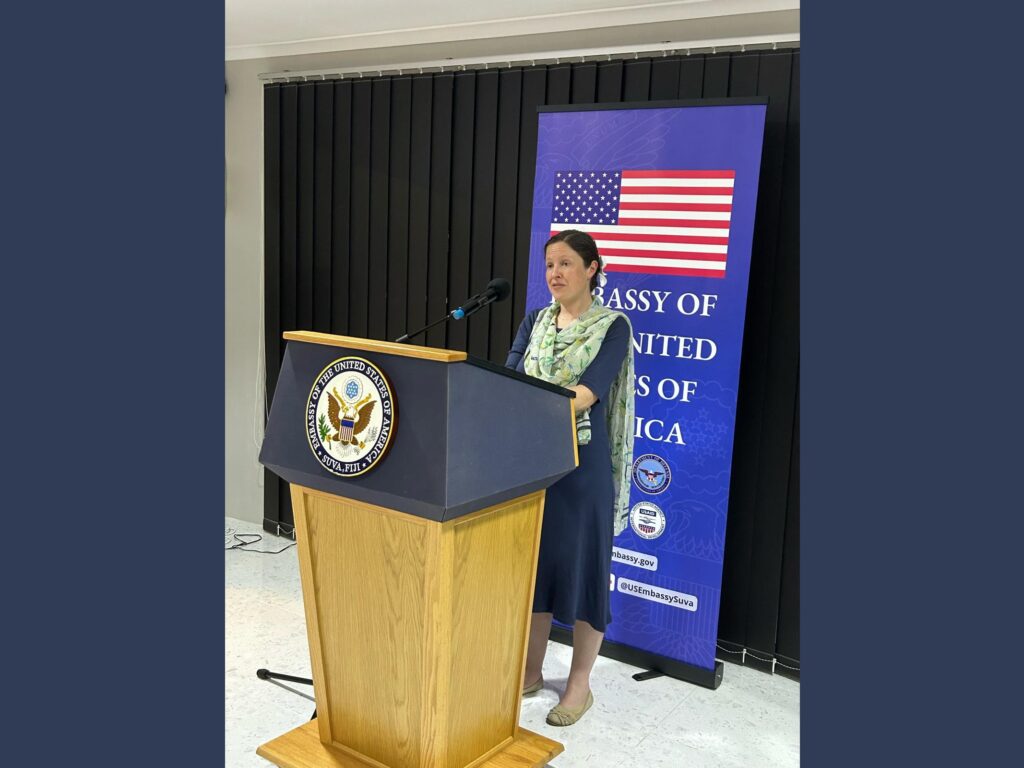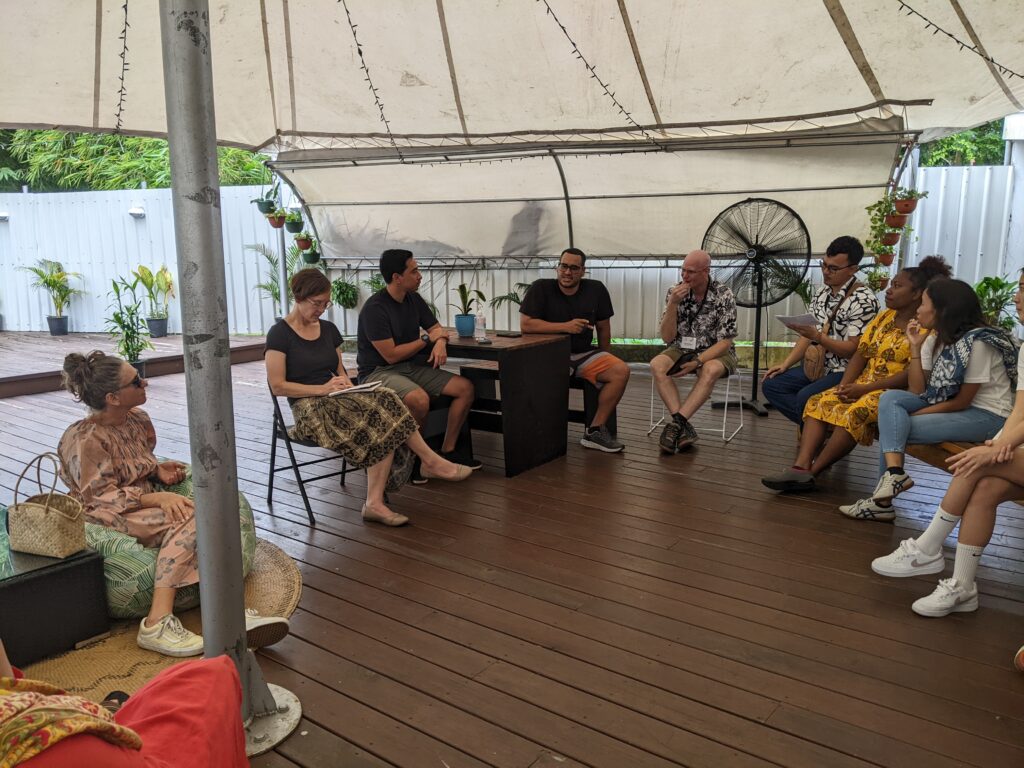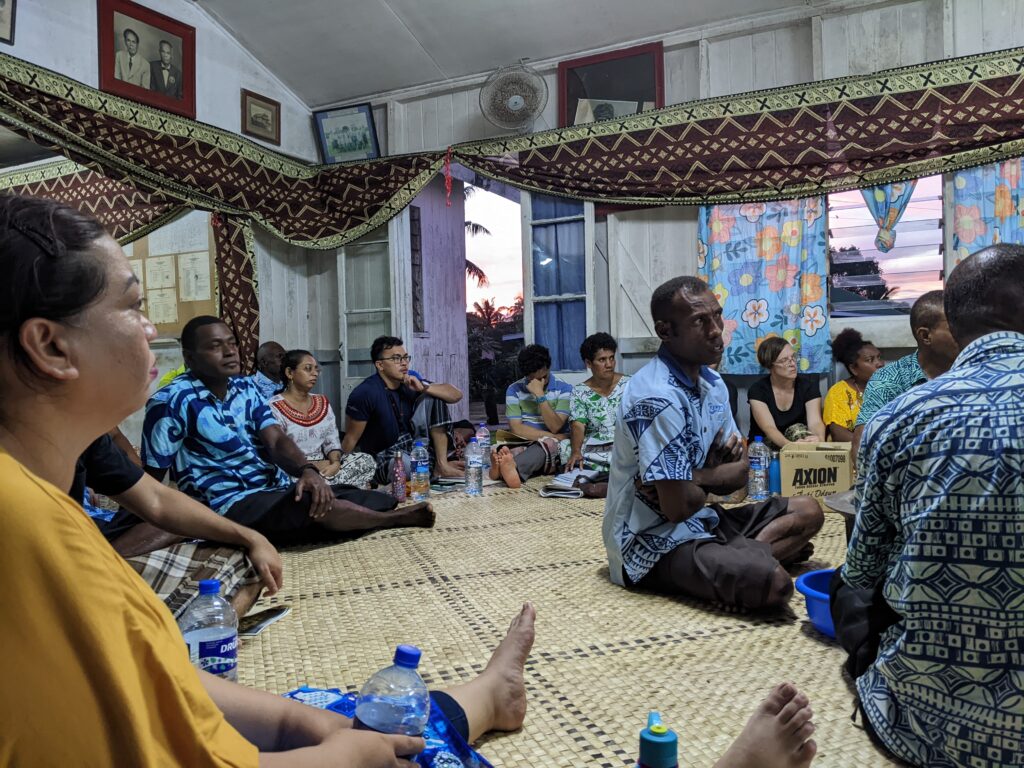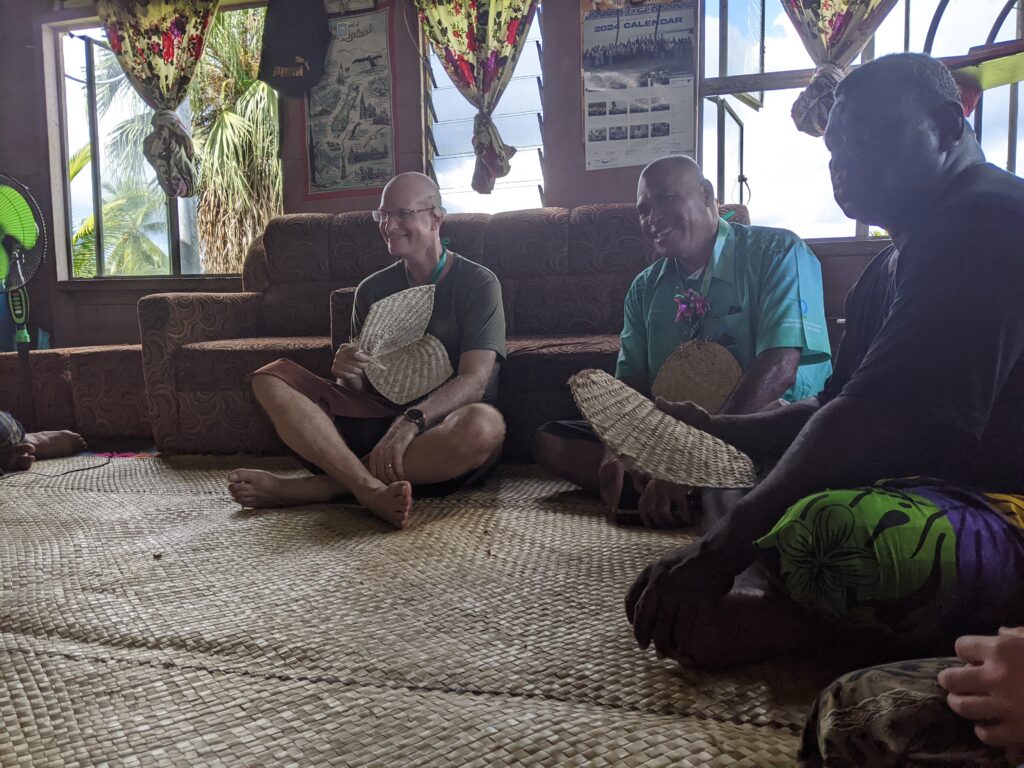<– Start at the beginning of the Climate Lab series
Fiji, Part 4 – Insights
Our week in Fiji for the Climate Lab pushed me outside my comfort zone, which is not in any way a bad thing. Our first week together in Hawai’i was – notably – a difficult time for me, having just gone through a devastating loss in my family, but I was grateful for the push that our work gave me to consider concepts bigger than myself. [1] While our week in Hawai’i involved someone else (notably from the program team at the East-West Center) encouraging me to consider new concepts (notably about my role as a leader), our time in Fiji felt fundamentally different. Specifically, it felt like the situation we were in was pushing me to consider new ideas, frames of mind, and ways of engaging. In a way, it was a reminder that this program was not designed to spoon-feed us new concepts from start to finish, but rather, to encourage us to take responsibility for our own learning and growth over the course of the program.
If not you, then who?
During our time in the classroom in Fiji, I was wowed from day one by the concept that I am not the only person in the world with impostor syndrome. We had multiple people join us as guest speakers and panelists throughout the week who made comments about how they couldn’t believe they were there in the room, speaking alongside such impressive guest speakers or speaking to members of such an impressive program. It was so striking that the very first thing I wrote in my notes on Monday morning was that “the biggest mistake any of us can make is to think we don’t have what it takes to make a difference, that we’re not worthy to step in (is that why many don’t?)”

Photo credit: Sarah Novak
In my previous posts about the concept of stepping up for leadership [2], I believe I flirted with the idea that many people don’t (step up) because we believe we’re not qualified to do so, and that if someone is better qualified, they will step in if/when they’re needed. But if there’s anything that I’ve learned in becoming an adult this year (entering your 40s and losing a parent qualifies as adulthood, right?), it’s that adults have no idea what they’re doing, and what appears from the outside to be competence is on the inside simply a willingness to try to make things better. Just look at my own professional journey: I was encouraged by others to apply to the JET Programme (which took me to Japan for two years and absolutely changed the course of my life), to my current job as executive director of a nonprofit (which is impossibly hard some days but still my dream job after four-plus years), and to this Climate Lab (which is currently stretching what I thought were my limits of comfort zone and impact on the planet) – all examples of things I never thought I could do but that others clearly believed I could.
If I take nothing else from my time in this year-long Climate Lab, I will take the idea that the world is filled with people who have the drive, the creativity, and the reason, but maybe not the confidence to step in and do something. And I get it – I know (and am one of) those people. But as long as those steps are taken in good faith with a desire to learn and improve – with a desire (as Brené Brown says) not to be right but to get it right [3] – that work is valuable. So, if I can only do one thing, it will be to encourage others to step in to vacuums that they see; to do what they think needs to be done, whether or not they think they have the knowledge or authority to do it. Whether your focus is climate change or something else, if you – yes you, reading this blog post – don’t step in to make a difference, no one else is going to fill the gap you create by robbing the world of your unique contribution.
If not now, then when?
As important as that revelation was for me (and I hope for at least one person reading this post), my intention is to provide some value beyond than that in the weeks, months, and years to come. I am immensely grateful for the opportunity I’ve been granted this year – to study, and travel, and share ideas with an incredibly impressive cohort of leaders (a group in which I’ve been struggling to justify my presence for the last 11 months, as of this blog post). It is my goal to make the most of this opportunity, pulling from independent research, group field visits, difficult introspective questions, and the expertise of my classmates. That goal is not simply one I have set for myself, but one that was set by the leaders of our program. I alluded to it in last week’s post, [4] but the question hanging over this whole experience is what are we going to do with everything we’ve learned over the past year?

It’s a question that was posed while we were in Fiji, with encouragement to start thinking about it then, around the halfway point, instead of waiting until the last moment. In fact, our group presentation in Fiji was far more exploratory and wide-reaching than was the one we created in Hawai’i to summarize what we had learned (and unlearned, and relearned) that week. We began those reflections in Fiji in a much more integrated fashion, starting no later than Monday afternoon with the question of where we were in Hawai’i, where we are in Fiji, and where we’re going in Japan, examining similarities, differences, and a logical progression of what we expected to take away – and to give back.
Looking back to our time in Hawai’i, we saw several themes emerge from our experiences: the use of narrative to share information and influence others, the value of diversity in identifying problems and co-creating solutions, and the necessity of delegation and decentralized decision making in effective leadership. Since returning home from our first in-person session, I have worked with my own management team to examine some of the concepts that have challenged me (one blog post at a time [5]) and consider how we can incorporate those lessons into our own day-to-day approach in our organization. We can all agree that there is value in considering these concepts, but – unsurprisingly – implementation is easier said than done.
Themes that revealed themselves in Fiji included the role of faith and religion in influencing action (while also recognizing the role of narrative in the context of religion), the weight of traditional gender roles and what power looks like in different situations (as described in last week’s post [6]), and the difficulties of taking a theory of change and turning it into a practice of change (including how to navigate a complex aid environment). Certainly, there are points of overlap to consider between Hawai’i and Fiji – notably the role of narrative, the value of community engagement, the history of colonialism and extractive practices, and a possible future of more equitable, nature-based solutions. But it is also critical to remember that each nation, each community, each individual is unique, and while we identified broad themes in our brief time on the ground, variations on those themes absolutely exist in ways that are uniquely meaningful to each individual location, if not each individual person.

Judge Not…
Despite the fact that I was a student of anthropology for a time in college and trained in cultural relativism, I know that I absolutely bring my own baggage with me when I travel, seemingly more so as I age. Although I know – fundamentally – that I shouldn’t be applying my own values to another culture, that also is easier said than done, and sometimes it takes specific examples to open my eyes to biases that I blanketly condemn in others and fail to recognize in myself. The biggest example of that mindset I encountered in Fiji is the simple – yet very loaded – phrase “why don’t they just…?”
In my interview for the Climate Lab in August 2023, one of the topics we discussed was the difficulty of shifting the fundamental economic drivers in a region – namely Appalachia, which is deeply tied to the extraction of natural resources (coal, oil, gas…). There is a clear need for us to shift away from the extractive practices of a heavily polluting industry and toward more sustainable, just, “green” – if you will – industries, but it is incredibly difficult to do that when the very identity of a region (and the pride of the people who live there) is so clearly intertwined with the work they do and the goods they produce.
I left Daku Village (and their nearby communities) with my MBA hat on, baffled that no one was considering a “Plan B” for revenue, as climate change threatened their lives and livelihoods. “If your fish, and your coconut trees, and your homes are at risk, what’s the alternative to what you’re doing now?” I wondered – and directly asked some people by the end of our visit. I couldn’t wrap my head around the fact that no one had considered an alternative. My classmate who is from Fiji explained to me that each village has a role, a thing they do that is theirs: in Daku it’s making fans, in another village it’s building canoes, in another it’s fishing, etc. To shift what they do would be almost as unthinkable as moving to a new location – something that really isn’t an option in Fijian culture either – because what you do and where you do it are fundamentally pieces of who you are.

It was at that moment I felt the scales fall from my eyes, and I thought of everyone who has ever said of Appalachia, or at least the Pittsburgh region, “why don’t they just do something other than coal / oil / gas extraction?” For Daku, “why don’t they just do something other than making fans?” is as difficult a question. That’s not to say such a shift will never need to happen in the future, but it is to say that it’s not as simple as switching from A to B when things like pride and even identity are on the line. And here is where we arrive at some very difficult unanswered questions about who has the perspective, the expertise, and/or the authority to be making decisions that impact the lives of others. And that is where we’ll pick up next week.
~
I’d love to hear if you have ideas or questions along this line of thought – please share them in the comments below. But for now, thank you for reading!
The Indo-Pacific Leadership Lab [7] is a program of the East-West Center,[8] with support from the Japan Foundation.[9]
As always, content on this blog reflects my personal views, and not those of any organization with which I am associated.
[1] https://radicalmoderate.online/climate-lab-hawaii-in-the-classroom/
[2] https://radicalmoderate.online/climate-lab-hawaii-insights-continued/
[3] https://www.goodreads.com/quotes/10692920-i-am-not-here-to-be-right-i-am-here
[4] https://radicalmoderate.online/climate-lab-fiji-in-the-field-continued/
[5] https://radicalmoderate.online/tag/climate-lab/
[6] https://radicalmoderate.online/climate-lab-fiji-in-the-field-continued/
[7] https://www.eastwestcenter.org/projects/indo-pacific-leadership-lab
[8] https://www.eastwestcenter.org/
0 Comments